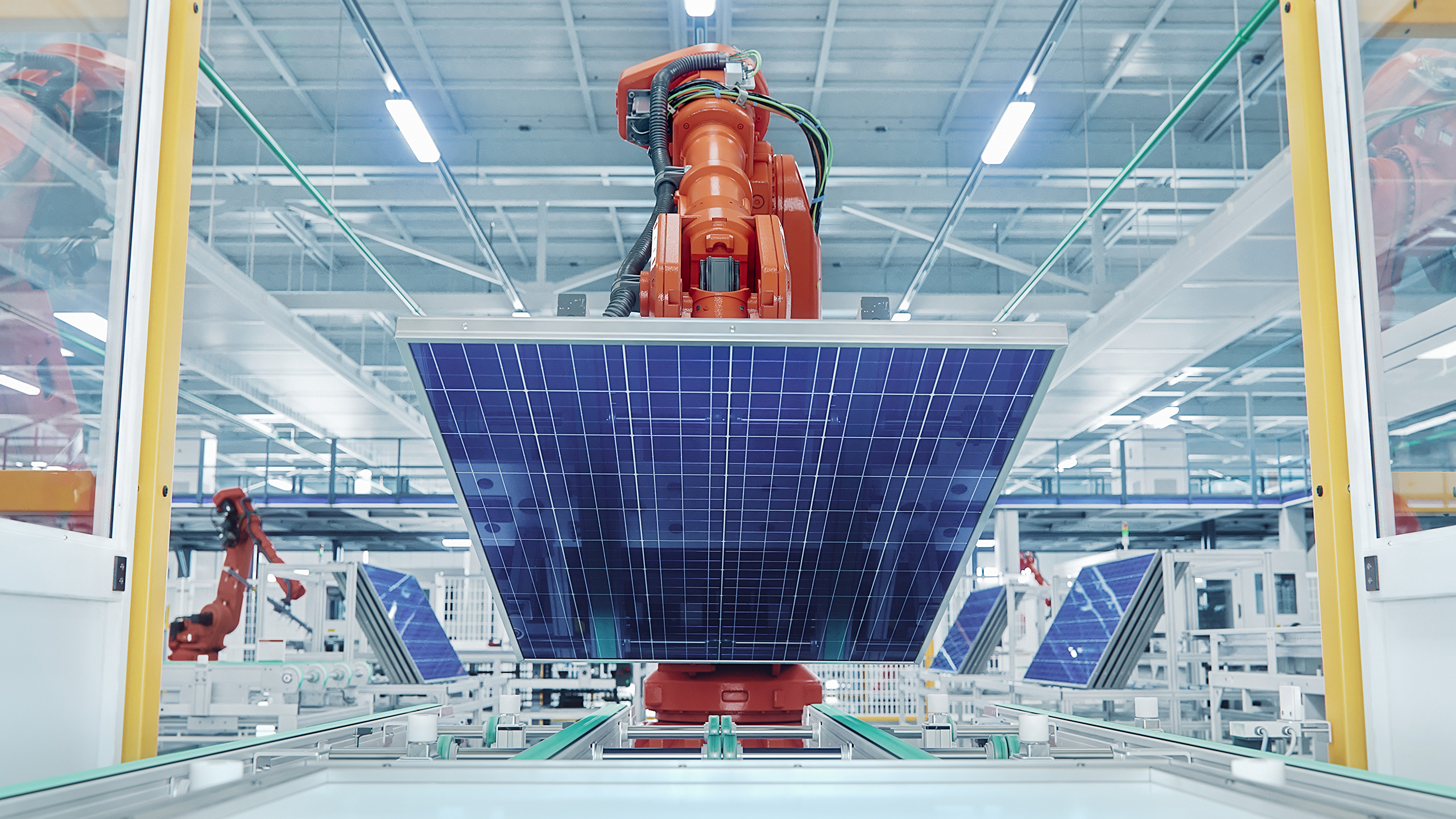Solar manufacturing is a heavily automated industry, but there are still opportunities for greater efficiency.
Solar panel manufacturing could not exist at scale without modern factory automation. From forming silicon into ingots to slicing those ingots into paper-thin wafers to assembling the wafers into solar cells, nearly every stage requires a level of precision and efficiency that cannot be matched by manual labor. It is no exaggeration to say that, without manufacturing automation, solar energy would not be a sustainable resource.
Despite this, a number of tasks remain which are still performed by human workers. These are primarily jobs which could not have been accomplished by the automation technology which existed even a decade ago, such as handling and inspecting silicon wafers, or installing and cleaning large outdoor panel arrays. Fortunately, the automation industry has continued to innovate.
Modern robots, novel manufacturing techniques, and Industry 4.0 technology offer a new range of automated solutions that are capable of taking over many of the industry’s current labor-intensive tasks. The following are some of the ways these solutions are being used to help make solar energy sustainable.
Advanced robots can now handle delicate silicon wafers without cracking or smudging.
Of all the technological improvements of the twenty-first century, advancements in robotics are among the most exciting. In the past, tasks that required careful handling were left to human workers.
But modern robots, with six-axis articulation, pressure-sensitive grips, and artificial vision systems can perform many of these tasks with greater speed and precision than their human counterparts, and are less prone to error. In an environment where a stray fingerprint can lower the effectiveness of a solar panel, robotic operators can increase output and reduce waste.
Vision systems allow for automated testing for cracks or imperfections in solar panels.
Quality control standards in the solar panel industry are exceptionally high. This is because silicon wafers are fragile and prone to breaking, and any crack or damage can reduce the effectiveness of a panel. Because a break can happen at almost any stage of production, silicon wafers undergo several rounds of inspection and testing during the process.
Visual inspections have long been the standard, but these tests are slow and tedious, requiring patience and close attention. Advances in vision technology allow for full automation of these inspection processes, allowing manufacturers to test more often, at lower cost, and with greater accuracy.
Mobile robots can assist in the outdoor installation and cleaning of large solar arrays.
Large solar panel fields require significant labor to install, a process made more difficult by the fragile nature of the solar panels themselves. The technology supporting mobile robots has advanced sufficiently in recent years to support installation crews, especially in unloading cargo. Robotic assistance not only speeds up the installation process—it also creates a safer work environment for crews by cutting down on the amount of heavy lifting required for the job.
Industry 4.0 is also making solar fields more intelligent, allowing companies to track their energy efficiency. One application that could be particularly useful is in determining a cleaning schedule for solar panels. As solar panels collect dust, they grow less efficient—a particular concern in dry climates that don’t receive much rain. Automated cleaning can help solar panels maintain efficiency while also using less water.
Automated solar manufacturing systems increase production efficiency and reduce waste.
For solar energy to be considered a truly green technology, it also has to be green to manufacture, as well as affordable for consumers. Manufacturing automation is less wasteful than traditional manufacturing, reducing costs and environmental impact in one blow.
Automation for solar panels has also grown more efficient over the years, with processes such as vacuum lamination, foam sealant, and high-speed framing eliminating whole production steps while also reducing the materials used. As a result, manufacturers have been able to efficiently scale their capacity, raising output while lowering costs.
Increased automation frees company resources to devote toward R&D efforts.
The sustainability of solar energy systems continues to improve, and in a competitive market, every advancement matters—both to maintain the operational effectiveness of manufacturers, and to develop greener technology. Businesses who can use automation to improve their bottom line can reinvest those savings into their R&D departments to search for even more efficient and sustainable technologies.
In fact, the U.S. Department of Energy has identified solar as a key component of plans to transition the United States energy sector off carbon-based power sources by 2035. Investment in solar manufacturing technology has become a priority as a means of creating a reliable and resilient supply chain for photovoltaic infrastructure. This makes further research into solar energy sources a smart business move from a competitive perspective, and as a way to become a vital part of the domestic green energy infrastructure.
Contact Eagle to learn more about how our automation technologies can help you meet your solar energy sustainability targets.
Eagle Technologies specializes in developing automated assembly systems that incorporate the latest advances in robotics and Industry 4.0. We have worked with premier manufacturers in the energy industry across the globe, partnering with them to develop custom automations that advance innovation in their sector. If you need to develop a specialized assembly to make a design a reality, we can help. Contact one of our representatives today to learn more about what we can help you achieve for your business.
![]() Connect With Eagle Technologies LinkedIn
Connect With Eagle Technologies LinkedIn
Eagle Technologies, headquarters in Bridgman, MI
Eagle builds the machines that automate manufacturing. From high-tech robotics to advanced product testing capabilities, Eagle offers end-to-end manufacturing solutions for every industry.


